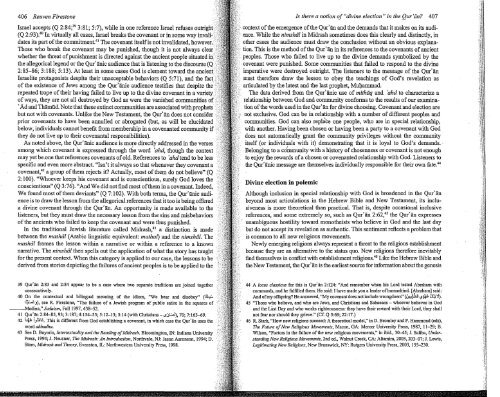reynolds-the-quran-in-its-historical-context-2
reynolds-the-quran-in-its-historical-context-2
reynolds-the-quran-in-its-historical-context-2
Create successful ePaper yourself
Turn your PDF publications into a flip-book with our unique Google optimized e-Paper software.
406 Reuven FirestoneIsrael accepts (Q 2:84; 39 3:81; 5:7), while <strong>in</strong> one reference Israel refuses outright(Q 2:93):~ 0 In virtually all cases, Israel breaks·<strong>the</strong> covenant or <strong>in</strong> some waydates <strong>its</strong> part of<strong>the</strong> commitment. 41 The covenant <strong>its</strong>elf is not <strong>in</strong>validated, however. ·:Those who break <strong>the</strong> covenant may be punished, though it is not always clearwhe<strong>the</strong>r <strong>the</strong> threat of punishment is directed aga<strong>in</strong>st <strong>the</strong> ancient people situated <strong>in</strong>,'<strong>the</strong> allegorical legend or <strong>the</strong> Qur' anic audience that is listen<strong>in</strong>g to <strong>the</strong> discourse (Q2:85-86; 3:188; 5:13). At least <strong>in</strong> some cases God is clement toward <strong>the</strong> ancientIsraelite protagonists despite <strong>the</strong>ir unacceptable behaviors (Q 5:71), and <strong>the</strong> factof <strong>the</strong> existence of Jews among <strong>the</strong> Qur' anic audience testifies that despite <strong>the</strong> ..repeated trope of <strong>the</strong>ir hav<strong>in</strong>g failed to live up to <strong>the</strong> div<strong>in</strong>e covenant <strong>in</strong> a variety 'of ways, <strong>the</strong>y are not all destroyed by God as were <strong>the</strong> vanished communities of'Ad and Thamild. Note that <strong>the</strong>se ext<strong>in</strong>ct communities are associated with prophetsbut not with covenants. Unlike <strong>the</strong> New Testament, <strong>the</strong> Qur'an does not considerprior covenants to have been annulled or abrogated (but, as will be elucidatedbelow, <strong>in</strong>dividuals cannot benefit from membership <strong>in</strong> a covenanted community if<strong>the</strong>y do not live up to <strong>the</strong>ir covenantal responsibilities).As noted above, <strong>the</strong> Qur'anic audience is more directly addressed <strong>in</strong> <strong>the</strong> versesamong which covenant is expressed through <strong>the</strong> word 'ahd, though <strong>the</strong> <strong>context</strong>may yet be.one that references covenants of old. References to 'ahd tend to be lessspecific and even more abstract. "Isn't it always so that whenever <strong>the</strong>y covenant acovenant, 42 a group of <strong>the</strong>m rejects it? Actually, most of <strong>the</strong>m do not believe" (Q2:100). "Whoever keeps his covenant and is conscientious, surely God loves <strong>the</strong>conscientious" (Q 3:76). "And We did not f<strong>in</strong>d most of <strong>the</strong>m <strong>in</strong> a covenant. Indeed,We found most of <strong>the</strong>m deviants" (Q 7:102). With both terms, <strong>the</strong> Qur'anic audienceis to draw <strong>the</strong> lesson from <strong>the</strong> allegorical references that it too is be<strong>in</strong>g offereda div<strong>in</strong>e covenant through <strong>the</strong> Qur'an. An opportunity is made available to <strong>the</strong>listeners, but <strong>the</strong>y must draw <strong>the</strong> necessary lesson from <strong>the</strong> s<strong>in</strong>s and misbehaviorsof<strong>the</strong> ancients who failed to keep <strong>the</strong> covenant and were thus punished.In <strong>the</strong> traditional Jewish literature called Midrash, 43 a dist<strong>in</strong>ction is madebetween <strong>the</strong> mashiil (Arabic l<strong>in</strong>guistic equivalent: mathal) and <strong>the</strong> nimshiil. Themashiil frames <strong>the</strong> lesson with<strong>in</strong> a narrative or with<strong>in</strong> a reference to a knownnarrative. The nimshiil <strong>the</strong>n spells out <strong>the</strong> application of what <strong>the</strong> story has taughtfor <strong>the</strong> present <strong>context</strong>. When this category is applied to our case, <strong>the</strong> lessons to bederived from stories depict<strong>in</strong>g <strong>the</strong> failures of ancient peoples is to be applied to <strong>the</strong>Is <strong>the</strong>re a notion of "div<strong>in</strong>e election" <strong>in</strong> <strong>the</strong> Qur 'an? 407· <strong>context</strong> of <strong>the</strong> emergence of<strong>the</strong> Qur'an and <strong>the</strong> demands that it makes on <strong>its</strong> audience.While <strong>the</strong> nimshiil <strong>in</strong> Midrash sometimes does this clearly and dist<strong>in</strong>ctly, <strong>in</strong>o<strong>the</strong>r cases <strong>the</strong> audience must draw <strong>the</strong> conclusion without an obvious explanation.This is <strong>the</strong> method of<strong>the</strong> Qur' an <strong>in</strong> <strong>its</strong> references to <strong>the</strong> covenants of ancientpeoples. Those who failed to live up to <strong>the</strong> div<strong>in</strong>e demands symbolized by <strong>the</strong>covenant were punished. Some communities that failed to respond to <strong>the</strong> div<strong>in</strong>eimperative were destroyed outright. The listeners to <strong>the</strong> message of <strong>the</strong> Qur' anmust <strong>the</strong>refore draw <strong>the</strong> lesson to obey <strong>the</strong> teach<strong>in</strong>gs of God's revelation asarticulated by <strong>the</strong> latest and <strong>the</strong> last prophet, MuQ.ammad.The data derived from <strong>the</strong> Qur'i<strong>in</strong>ic use of mithaq and 'ahd to characterize arelationship between God and community conforms to <strong>the</strong> results of our exam<strong>in</strong>ationof <strong>the</strong> words used <strong>in</strong> <strong>the</strong> Qur'an for div<strong>in</strong>e choos<strong>in</strong>g. Covenant and election arenot exclusive. God can be <strong>in</strong> relationship with a number of different peoples andcommunities. God can also replace one people, who are <strong>in</strong> special relationship,with ano<strong>the</strong>r. Hav<strong>in</strong>g been chosen or hav<strong>in</strong>g been a party to a covenant with Goddoes not automatically grant <strong>the</strong> community privileges without <strong>the</strong> community<strong>its</strong>elf (or <strong>in</strong>dividuals with it) demonstrat<strong>in</strong>g that it is loyal to God's demands.·Belong<strong>in</strong>g to a cdmmunity with a history of chosenness or covenant is not enoughto enjoy <strong>the</strong> rewards of a chosen or covenanted relationship with God. Listeners to<strong>the</strong> Qur'anic message are <strong>the</strong>mselves <strong>in</strong>dividually responsible for <strong>the</strong>ir own fate. 44Div<strong>in</strong>e election <strong>in</strong> polemicAlthough <strong>in</strong>clusio.n <strong>in</strong> special relationship with God is broadened <strong>in</strong> <strong>the</strong> Qur'anbeyond most articulations <strong>in</strong> <strong>the</strong> Hebrew Bible and New Testament, <strong>its</strong> <strong>in</strong>clusivenessis more <strong>the</strong>oretical than practical. That is, despite occasional <strong>in</strong>clusivereferences, and some extremely so, such as Qur'an 2:62, 45 <strong>the</strong> Qur'an expressesunambiguous hostility toward mono<strong>the</strong>ists who believe <strong>in</strong> God and <strong>the</strong> last daybut do not accept <strong>its</strong> revelation as au<strong>the</strong>ntic. This sentiment reflects a problem thatis common to all new religious movements.Newly emerg<strong>in</strong>g religions always represent a threat to <strong>the</strong> religious establishment .because <strong>the</strong>y are an alternative to <strong>the</strong> status quo. New religions <strong>the</strong>refore <strong>in</strong>evitablyf<strong>in</strong>d <strong>the</strong>mselves <strong>in</strong> conflict with establishment religions. 46 Like <strong>the</strong> Hebrew Bible and<strong>the</strong> New Testament, <strong>the</strong> Qur' an is <strong>the</strong> earliest source for <strong>in</strong>formation about <strong>the</strong> genesis39 Qur'iln 2:83 and 2:84 appear to be a case where two separate traditions are jo<strong>in</strong>ed toge<strong>the</strong>rconsecutively.40 On <strong>the</strong> <strong>context</strong>ual and bil<strong>in</strong>gual mean<strong>in</strong>g of <strong>the</strong> idiom, "We hear and disobey" (~~ j), see R. Firestone, "The failure of a Jewish program of public satire <strong>in</strong> <strong>the</strong> squares of--Med<strong>in</strong>a," Judaism, Fall 1997,438-52.41 Qur'i<strong>in</strong> 2:84-85, 93; 3:187; 4:154-55; 5:12-13; 5:14 (with Christians -


